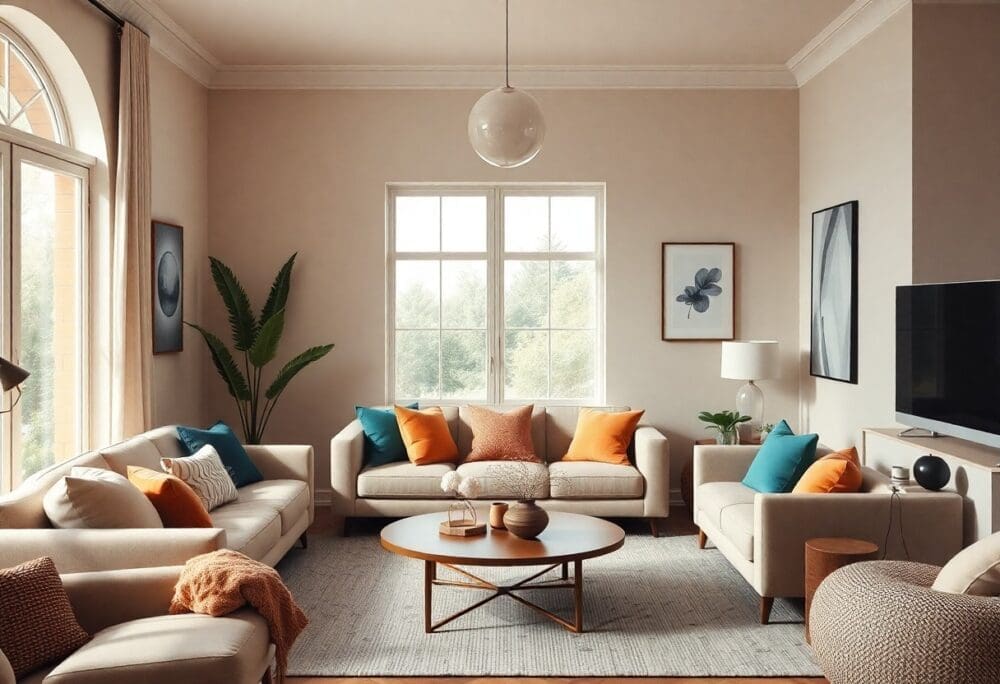Decor plays a pivotal role in shaping the ambiance of your living space, and understanding the latest color trends can elevate your home to new heights. In this complete guide, you’ll discover how to incorporate trending colors into your decor, making informed choices that truly reflect your personal style. Whether you’re looking to make a bold statement or create a serene retreat, we’ll explore palettes that enhance your home’s aesthetic and functionality, ensuring your decor isn’t just beautiful but also timeless.
Key Takeaways:
- Embrace bold, vibrant colors to create a statement in any room, as they can enhance mood and energy levels.
- Neutral tones remain popular, offering a versatile backdrop that allows for easy updates with accessories and decor.
- Natural hues inspired by the environment, such as greens and earthy tones, promote a sense of calm and connection to nature in home spaces.
Understanding Color Trends
A color trend in home decor can transform your living space and reflect your personality. These trends often evolve, influenced by the latest fashion in art, design, and even cultural movements. Whether you’re renovating or redecorating, being attuned to color trends helps you make informed choices that will enhance the overall ambiance of your home, ensuring it remains stylish and inviting.
Types of Color Trends in Home Decor
Some common types of color trends in home decor include:
| Classic Colors | Timeless shades that remain popular over the years. |
| Seasonal Shades | Colors that resonate with seasonal trends and moods. |
| Bold Accents | Vibrant colors used for dramatic impact. |
| Soft Neutrals | Calm and soothing shades that create a peaceful environment. |
| Eclectic Mixing | A combination of diverse colors and styles for a unique look. |
The right color choice can create the desired atmosphere and set the mood for your space.
Factors Influencing Color Choices
Influencing factors for your color choices include personal preferences, current design trends, and the functionality of the space. Different colors evoke various emotions and can affect the perceived size or warmth of a room. Consider how lighting, furniture, and the overall layout can impact your color selection as you aim to create a harmonious decor scheme.
- Your personal style and tastes
- The specific purpose of the room
- Lighting conditions within the space
- Existing furniture and finishes
- Current design trends that resonate with you
Knowing how these factors intersect can help you make choices that not only reflect your style but ensure your home feels cohesive and inviting.
A successful color palette balances your preferences with practical considerations like maintenance and the room’s function. Honing in on your vision will steer you toward the colors that speak to you, enhancing the overall feel of your home.
- Assess your emotional response to colors
- Consider the practicality of color maintenance
- Determine how colors work with your existing decor
- Explore options that enhance natural light
- Experiment with small swatches before committing
Knowing how to blend style with functionality will ensure your choices in home decor reflect your individuality while remaining practical.
Practical Tips for Choosing Colors
There’s a science to choosing the right colors for your home decor, and a few practical tips can make all the difference. Start by considering your space and the mood you want to create. Keep these tips in mind:
- Assess the natural light in the room.
- Think about your existing furniture and décor.
- Test paint samples to see how they look at different times of the day.
Assume that these steps will guide you toward a harmonious color scheme that reflects your personal style.
Tips for Pairing Colors Effectively
Choosing colors that complement each other can enhance the overall aesthetic of your space. Here are some effective strategies:
- Use the color wheel to find complementary and analogous colors.
- Incorporate a neutral base to balance vibrant hues.
- Consider the 60-30-10 rule for distributing colors in a room.
Knowing how to pair colors will elevate your home decor and create a cohesive look.
Step-by-Step Guide to Color Selection
Any successful color selection process involves a structured approach to ensure your decor reflects your style. Follow these steps:
| 1. Define Your Style | Identify whether you prefer modern, traditional, or eclectic designs. |
| 2. Gather Inspiration | Create a mood board with colors and patterns that resonate with you. |
| 3. Evaluate Lighting | Assess how natural and artificial light affects color perception. |
| 4. Select a Color Palette | Choose a primary color and several accents that complement each other. |
| 5. Test in Your Space | Apply samples on your walls or objects, viewing them at different times. |
With a methodical approach, you can confidently select the colors that bring your vision to life. Exploring a diverse palette allows you to gauge your preferences, while practical testing ensures that your choices harmonize with your space and lifestyle. This process helps prevent common mistakes and assures you of a design that suits your personal taste.
| 1. Define Your Style | Learn what styles appeal to you through research and exploration. |
| 2. Gather Inspiration | Look at magazines, websites, and social media for ideas. |
| 3. Evaluate Lighting | Consider how your space feels during different times of the day. |
| 4. Select a Color Palette | Develop a harmonious palette that echoes your style. |
| 5. Test in Your Space | Life with color intensities and how they play together. |
Pros and Cons of Popular Color Schemes
Not all color schemes are created equal. Understanding the pros and cons of popular color palettes can help you make informed choices for your home decor. Below is a breakdown of the advantages and disadvantages to consider before plunging into your next project.
| Pros | Cons |
|---|---|
| Enhances mood and energy | Can be overwhelming if overused |
| Creates an inviting atmosphere | May clash with other elements |
| Offers a modern look | Trends can quickly change |
| Brings unity to your decor | Lacks visual interest if too monochrome |
| Flexible and versatile choices | May require frequent updates |
For more insights, check out The biggest color trends of 2025.
Pros of Bold Colors
Popular bold color schemes can invigorate your space, making it feel dynamic and alive. These vivid tones often serve as great conversation starters and can reflect your personality in an expressive way. By incorporating bold colors, you can create a focal point that draws the eye, enhancing the overall energy of your home.
Cons of Neutral Palettes
Pros of neutral palettes can offer a calming, timeless feel, but they also carry some drawbacks.
This understated approach may lead to a lack of personality in your decor, making spaces feel flat or uninviting. If you’re not careful, too many neutral tones can blend together, resulting in an uninspiring and lifeless atmosphere. With careful planning and accent elements, however, you can still achieve depth and character while working with neutral color schemes.
Final Words
Ultimately, understanding color trends for home decor empowers you to create spaces that reflect your personality and style. By incorporating the latest hues and palettes, you can elevate your environment, making it both inviting and on-trend. Whether you choose bold statements or subtle accents, the right colors can transform your home into a sanctuary. Embrace these trends as a guide, and don’t hesitate to experiment with combinations that resonate with you. Your home should be a true reflection of you, infused with warmth and character.
FAQ
Q: What are the top color trends for home decor in 2023?
A: In 2023, trending colors for home decor include calming greens, warm terracottas, and soft pastels. Shades of sage and olive green have become popular for creating serene spaces, while terracotta tones add warmth and an earthy feel. Additionally, soft pastel hues such as blush pink and powder blue are making a comeback, offering a refreshing touch to interiors. These colors can be paired with neutral tones to create balanced and inviting environments.
Q: How can I incorporate trendy colors into my home without making it feel overwhelming?
A: To effectively incorporate trendy colors into your home decor, consider starting with accent pieces such as throw pillows, artwork, or decorative accessories. This allows you to introduce new colors gradually. You can also choose a feature wall to paint in a bold color while keeping the other walls neutral. Textiles like rugs or curtains in trendy colors can also enhance the decor without overwhelming the space. Balance is key; ensure the color scheme complements your existing decor for a cohesive look.
Q: Are there specific color combinations that work well together for home decor?
A: Yes, certain color combinations can enhance the overall aesthetic of a room. For example, pairing soft pastels like lavender with beige or warm gray creates a calming environment, ideal for bedrooms. For a more vibrant look, combining deep teal with mustard yellow adds energy and sophistication to living areas. Earthy hues like terracotta with olive green can also create a harmonious and organic feel. Always consider the mood you want to achieve when selecting color combinations for your home decor.






